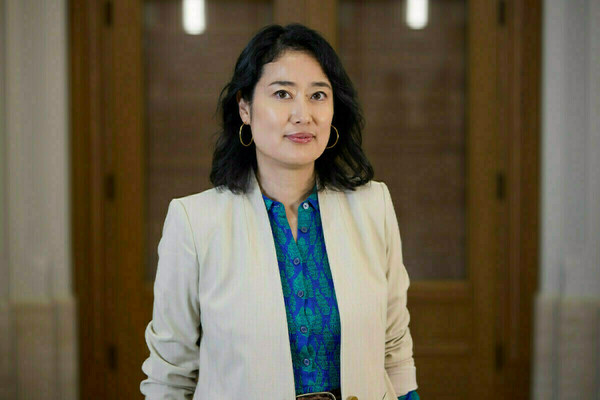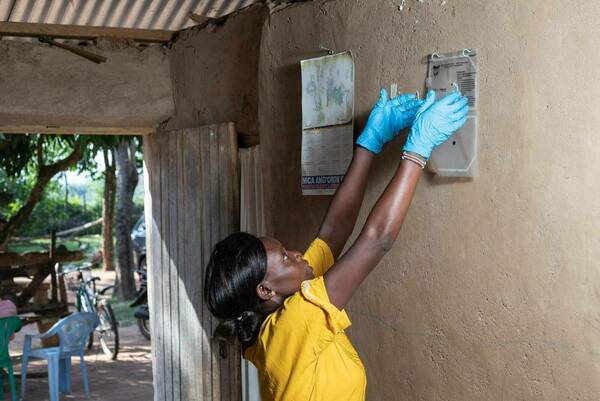Researcher shows how immigration policy can strengthen opportunity

Amy Hsin wants policymakers and the public to understand how immigration policy choices create barriers that limit opportunity. How do these structural forces hinder people from pursuing education, securing good jobs and planning for the future? And what might better alternatives look like?
A sociologist and social demographer, Hsin has joined the University of Notre Dame’s Keough School of Global Affairs as professor of migration. She is affiliated with the Notre Dame Poverty Initiative, a University-wide effort to create a world intolerant of poverty by expanding knowledge about how to solve it; and with the Keough School’s Klau Institute for Civil and Human Rights.
“I am excited to be at Notre Dame,” Hsin said. “The University’s commitment to recognizing the dignity of each person and supporting opportunity is an important part of public dialogue about immigration, and my work can help inform that conversation.”
Understanding life as an undocumented person
Much of Hsin’s recent work has focused on a particular group affected by immigration policy: undocumented college students in New York City. Her upcoming book, “Beyond Dreamers: School, Work, and Identity among Diverse Undocumented New Yorkers,” aims to provide a detailed portrait of this community.
Hsin and her co-author Sofya Aptekar, a faculty member at City University of New York’s School of Labor and Urban Studies, draw on more than 100 interviews, as well as fieldwork and administrative data. They highlight the racial, national and class diversity of this community, which includes people from Latin America, East Asia, the Middle East and Africa as well as Eastern Europe and the Caribbean.
“I have researched how race, ethnicity and nationality shape the experience of illegality among this group of young adults as they’ve transitioned from high school to college and into the labor market,” Hsin said. “I’m interested to see how they envision their future in this country and make plans for their careers and family life.”
Providing evidence to improve policy
Hsin’s findings on the lives of undocumented students shed light on larger structural issues with how the United States manages immigration. She has found that current rules reinforce existing inequalities because of how they sort people into different legal categories.
For instance, immigrants with fewer resources are more likely to cross a border without authorization, Hsin said, and have few paths to legal status after doing so.
By contrast, she said, wealthier and more educated immigrants can typically secure visas, and they have more options to obtain documentation if their visas expire.
“Current policies sort people by nationality, income and education into these different paths,” Hsin said. “The most vulnerable people are filtered into the pathway that provides the fewest options. Understanding this reality is critical to providing a better alternative.”
This analysis reflects Hsin’s approach. She wants everyone, from lawmakers and judges to everyday citizens, to have a more accurate and complete understanding of how policy choices affect people.
With that in mind, Hsin continues to inform broader immigration conversations. Her work has been cited in prominent media outlets, including The New York Times and The Economist. In addition, she has co-authored two amicus briefs for the U.S. Supreme Court: one in 2019 defending the Deferred Action for Childhood Arrivals policy and another earlier this year defending birthright citizenship.
Hsin’s public engagement builds on a broader record of scholarship examining how families and communities shape opportunities for young people. She has published over 20 peer-reviewed journal articles and examined topics such as how Asian immigrant parents influence their children’s K-12 educational outcomes.
“As a researcher, I want to help people see how policies can create opportunity for the most vulnerable and help address poverty,” Hsin said. “Better policies can help more people build stronger futures.”

Amy Hsin
Professor of Migration
Amy Hsin researches how immigration intersects with race, education and social inequality in the United States.
Full BiographyOriginally published by at keough.nd.edu on September 24, 2025.
Latest Research
- NSF Cyber SMART’s fall meeting shapes fifth year of project, legacy and future plans, and adds new memberThe U.S. National Science Foundation (NSF) Cyber SMART center gathered for its fall meeting on the University of Notre Dame campus this September. The meeting served as a checkpoint with progress reports and new projects from research leads and students…
- Slavic and Eurasian studies professor wins Humboldt fellowship to research how Russia’s religious past shapes its presentWhen Russia invaded Ukraine on Feb. 24, 2022, Sean Griffin realized his second book needed a new title. Griffin, an associate professor in the University of Notre Dame’s Department of…
- Notre Dame’s R.I.S.E. AI Conference builds interdisciplinary collaboration to inform human-centered artificial intelligenceAs artificial intelligence (AI) transforms nearly every sector of society — from healthcare and education to governance and global development — a critical question emerges: How can we conscientiously design and deploy these powerful technologies to positively impact society? This…
- University of Notre Dame joins the Global Coalition of Ukrainian StudiesThe University of Notre Dame has joined the Global Coalition of Ukrainian Studies after signing a Memorandum of Cooperation (MOC), formalized on September 24, 2025, at the Ukrainian Institute of America in New York City. Notre Dame joined four other American…
- The University of Notre Dame’s Mendoza College of Business and Industry Labs team up to inspire national security manufacturing competitiveness in the regionThe South Bend - Elkhart Region is full of manufacturing companies that are poised to grow, and Executive Master of Business Administration (EMBA) and Master of Business Administration (MBA) students at the University of Notre Dame are finding innovative ways to contribute to that growth. Earlier…
- Notre Dame research informs WHO conditional recommendation for spatial repellents in malaria vector controlThe World Health Organization (WHO) recently announced a “conditional recommendation” for spatial emanators, also known as “spatial repellents,” in the fight against malaria. This key determination was informed by spatial repellent studies that included the Advancing Evidence for the Global Implementation of Spatial Repellents (AEGIS) Project in Kenya, led by the University of Notre Dame and funded by Unitaid. The findings from this particular study were recently published in The Lancet.













